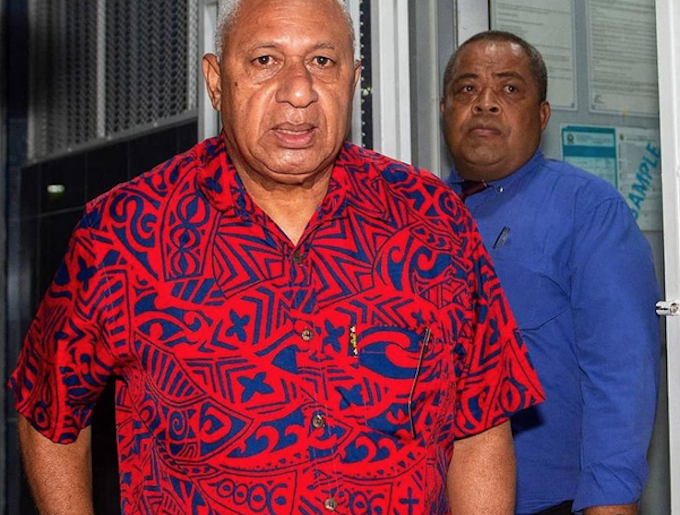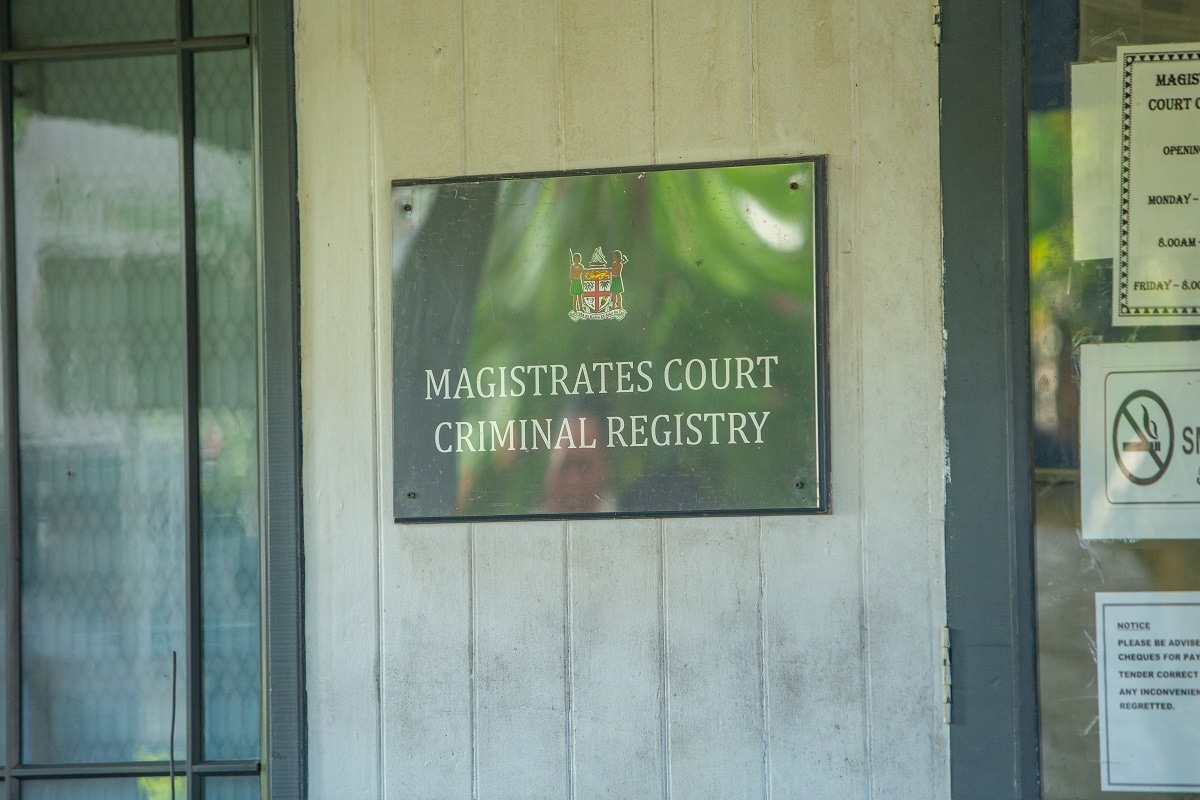
ANALYSIS: By Shailendra Bahadur Singh in Suva
The long-running row between the former Fiji government and the Suva-based regional University of the South Pacific (USP) has come back to haunt former Fiji Prime Minister Voreqe Bainimarama, who spent a night in a police cell on March 9 before appearing in court, charged with abuse of office.
Not only did the “USP saga”, as it came to be known, cause a major rift between Fiji and the other 12 USP-member countries, but it may have contributed to the narrow loss of Bainimarama’s FijiFirst Party (FFP) in the December 2022 election.
Bainimarama’s abuse of office charges included accusations of interfering with a police investigation into financial malpractices at USP. If convicted, he would face a maximum sentence of 17 years in jail.
- READ MORE: Fiji’s Bainimarama granted bail, ordered to remain in country
- Former Fiji PM Bainimarama and suspended police chief charged
- The USP saga
But there are also serious questions about the future of the party that he co-founded, and which won successive elections in 2014 and 2018 on the back of his popularity.
A day before his indictment, there were surreal scenes at the Suva Central Police Station, as police officers marched an ashen-faced Bainimarama to his cell to spend the night before his court appearance the next morning.
This, under the full glare of live media coverage, with journalists tripping over themselves to take pictures of the former military strongman, who installed himself as prime minister after the 2006 coup and ruled for 16 years straight.
Arrested, detained and charged alongside Bainimarama was his once-powerful police chief, Sitiveni Qiliho, who managed a wry smile for the cameras. Both were released on a surety of F$10,000 (about NZ$7300) after pleading not guilty to the charges.
Shut down police investigation
It is alleged that in 2019, the duo “arbitrarily and in abuse of the authority of their respective offices” shut down a police investigation into alleged irregularities at USP when former vice-chancellor Rajesh Chandra was in charge.

In November 2018, Chandra’s replacement, Professor Pal Ahluwalia, revealed large remuneration payments to certain USP senior staff, some running to hundreds of thousands of dollars. The Fiji government, unhappy with Ahluwalia’s attack on Chandra, counter-attacked by alleging irregularities in Ahluwalia’s own administration.
As the dispute escalated, the Fiji government suspended its annual grant to the USP in a bid to force an inquiry into its own allegations.
When an external audit by the NZ accountants BDO confirmed the original report’s findings, the USP executive committee, under the control of the then Fiji government appointees, suspended Ahluwalia in June 2020.
This was in defiance of the USP’s supreme decision-making body, the USP Council, which reinstated him within a week.
Samoa’s then Deputy Prime Minister Fiamē Naomi Mataʻafa (who is now prime minister, having won a heavily contested election of her own) said at the time that Ahluwalia’s suspension had been a “nonsense”.
The then Nauruan President Lionel Aingimea attacked a “small group” of Fiji officials for “hijacking” the 12-country regional university.
Students threatened boycott
The USP Students’ Association threatened a boycott of exams, while more than 500 signatures supporting the suspended vice-chancellor were collected and students protested across several of USP’s national campuses. All these events played out prominently in the regional news media as well as on social media platforms.
With Fiji’s national elections scheduled for the following year, the political toll was becoming obvious. However, Bainimarama’s government either did not see it, or did not care to see it.
Instead of backing off from what many saw as an unnecessary fight, it doubled down. In February 2021, around 15 government police and security personnel along with immigration officials staged a late-night raid on Professor Ahluwalia’s Suva home, detained him with his wife, Sandra Price, and put them in a car for the three-hour drive to Nadi International Airport where, deported, they were put on the first flight to Australia.
The move sent shockwaves in Fiji and the region.
To many, it looked like a government that had come to power in the name of a “clean-up campaign” against corruption was now indulging in a cover-up campaign instead. The USP saga became political fodder at opposition rallies, with one of their major campaign promises being to bring back Professor Ahluwalia and restore the unpaid Fiji government grant that stood at F$86 million (about NZ$62 million) at the time.
A month before the 2022 polls, a statement targeting the estimated 30,000 staff and student cohort at USP, their friends and families, urged them to vote against FijiFirst, which would go on to lose government by a single parliamentary vote to the tripartite coalition led by another former coup leader, Sitiveni Rabuka.
Albanese official visit
It was Rabuka who greeted Australian Prime Minister Anthony Albanese on his first official visit to Fiji last week. During talks at the Australian-funded Blackrock military camp, Albanese reportedly secured Rabuka’s support for the AUKUS deal.
Australia is keen for stability in Fiji, which has not had a smooth transition of power since independence, with democratically elected governments removed by coups in 1987, 2000 and 2006. Any disturbance in Fiji has the potential to upset the delicate balance in the region as a whole.
For Bainimarama and his followers, there is much to rue. His claimed agenda — to build national unity and racial equality and to rid Fiji of corruption — earned widespread support in 2014.
His margin of victory was much narrower in 2018 but Bainimarama managed to secure a majority in Parliament to lead the nation again.
His electoral loss in 2022 was followed by a series of dramatic events, which first saw Aiyaz Sayed-Khaiyum, his deputy in all but name, disqualified from holding his seat in Parliament.
Bainimarama went next, suspended for three years by Parliament’s privileges committee for a speech attacking head of state Ratu Wiliame Katonivere. He chose to resign as opposition leader.
Following his March 10 hearing, Bainimarama addressed the media and a few supporters outside court, adamant that he had served the country with “integrity” and with “the best interests” of all Fijians at heart. The former leader even managed to smile for the cameras while surrounded by a group of followers.
With nearly double the personal votes of the sitting PM Rabuka under Fiji’s proportional representation voting system, Bainimarama’s supporters still harboured some hope that he could return as the country’s leader one day.
However, his health is not the best. He is now out of Parliament and bogged down by legal troubles. Is the sun now setting on the era of Bainimarama and FijiFirst?
Dr Shailendra Bahadur Singh is a frequent contributor to Asia Pacific Report and is on the editorial board of the associated Pacific Journalism Review. This article was originally published by the Lowy Institute’s The Interpreter and is republished here with the author’s permission.












































